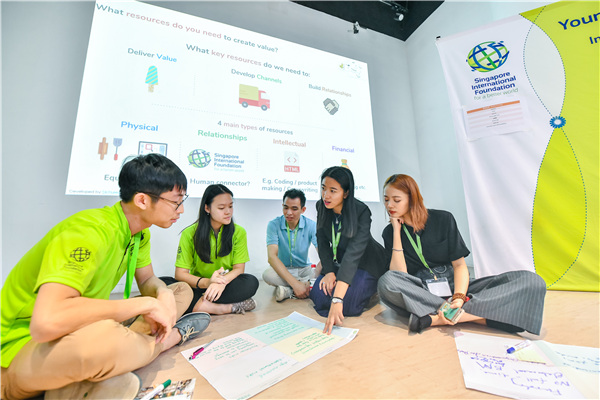 |
|
Young entrepreneurs take part in an overseas workshop hosted by the Young Social Entrepreneurs Program. [Photo provided to China Daily] |
Two Chinese companies make this year's shortlist of a program for young entrepreneurs.
Fung Ka-yan was thrilled when she made the shortlist of the Young Social Entrepreneurs Program organized by the Singapore International Foundation in September.
"I feel happy to be on one of the shortlisted teams, representing Hong Kong, China," Fung says.
Her team first attended the virtual YSE Workshop from July to August. They were mentored by business consultants from McKinsey & Company and Temasek International, as w
ell as established entrepreneurs relevant to her sector.
"We learned how to be effective social entrepreneurs with sessions on finance, marketing and impact measurement during the program," says Fung. "Additionally, we were able to connect with and learn from business consultants and social-impact leaders."
Fung, who's in her early 30s, founded Gabi in 2019 and has been committed to promoting equal education. She had been a tutor for almost 10 years and had noticed that many students were faced with learning difficulties.
"Through my research, I found out that the main reason students got poor results was due to inappropriate teaching methods and late detection of dyslexia, and not because they are lazy or unintelligent," Fung says.
When she was doing her master's degree in Asian studies in Germany in 2016, she found a systematic framework and saw that many policies were in place to help students with special education needs.
Fung realized that the support for such students was lacking in Hong Kong when she returned in 2018. So, she decided to set up Gabi and help students with dyslexia overcome their difficulties.
"We focus on designing and developing deep-learning technology for dyslexia pre-screening by using non-Western languages," Fung says.
Her team has helped primary school students by identifying if they are at risk of having dyslexia through quick pre-screening, early-intervention and training. They also refer cases to a registered specialist if students require further assessment, according to Fung.
"We work with various institutions in Hong Kong and Singapore and now have over 300 users," Fung says.
She says her team applied for the Young Social Entrepreneurs Program to expand their networks for potential collaboration and opportunities in future.
Her team is working with their mentor to refine their final business pitch, in preparation for the pitching session in March for a chance to win funding of up to 100,000 yuan ($15,300).
"This would help to scale up Gabi as a social enterprise," Fung says.
Fung says her team will allocate 40 percent of it to research and corporate partnerships with local institutes to work on analysis work, if they could get the grant. Another 40 percent of the fund will go to data collection in both Hong Kong and Singapore, while 20 percent will be used on the design for product localization, she adds.
"Gabi's long-term goal is to expand beyond Hong Kong and reach out to the Chinese mainland and Singapore."
Fung's team is one of two Chinese teams among 15 others that made the YSE shortlist. They were selected from 54 teams from 19 countries and regions, including Indonesia, India and Malaysia, based on their business plans.
The eight-month YSE program aims to inspire and enable youths of different nationalities to start or scale up their social enterprises, says Sherilyn Chia, assistant manager with Singapore International Foundation's Impact Networks.